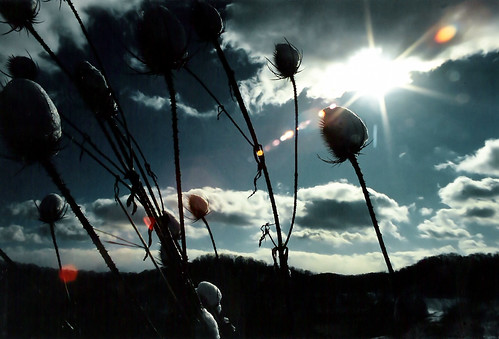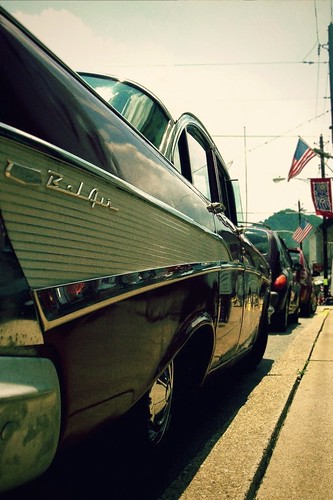
A 1970's Praktica MTL-5 with a dead light meter (no functioning electronics):

$5 thrift-store Mamiya 1000TL from the 1960's with a Montgomery Wards lens:

A 3.2 megapixel Kodak Easyshare with no zoom:

A $55 Polaroid 6 MP camera from Wal Mart.

Posted on 07/06/2012 5:39:13 PM PDT by SWAMPSNIPER
This small mountain of gear leads to two very frightening thoughts. Firstly, there’s no ending in sight; one keeps accumulating more and more equipment in order to keep pushing the edge of what’s possible both from a compositional and artistic standpoint, as well as from an image quality standpoint. You’ve either got to have a great day job and very deep pockets, or some good recurring clients.
The second thought is around obsolescence. In the film days, the camera body and lenses lasted a long time; you invested in glass, got a decent body – one that fulfilled your personal needs as a photographer – and then picked the right film for the job. In that sense, image quality differences between brands were down to the lenses and the photographer. This is to say that if you put the same film in every camera, the difference in sharpness or acuity or color or whatever would be down to the lens only. If you wanted more image quality, you went for a bigger format – and thus a larger sensor. The digital equivalent to this would be having only one photo site design of a fixed pixel pitch; say around 4.9 microns, which would get you 16MP at APS-C, 36MP at FX, about 60MP on 645, and something silly on large format. For an equivalent size print, the larger format would definitely outdo the smaller format by an amount proportional to the difference in resolution.
/johnny
pinglist
Now, that thar is funny and I don't care WHO y'are ...
And no need for forgiveness Lord for them Pygmies.
LOL!
Me neither!
SLR/DSLR lenses hold their value. Now that the pixel counts are higher than most consumers need or will ever really use, the is less of a reason to upgrade. I spent about $1700 on my camera body 3 years ago and I have no desire to upgrade, unlike the DSLR body I had prior to that that cost about $900.
|
Last night a tat artist agreed to trade me some ink on my delt for it. I agreed then thought better of it this morning and backed out. I'll pay the twenty sawbucks to look pretty and still have the Tri-X holder. |
Oh man don’t say that
Maybe six years ago I purchased (for a high price) a name brand digital movie camera. Last year it crapped out on me and the manufacturer’s representative told me in a superior tone of voice that there was repairing it..after all, technology had just moved on and it was obsolete. They offeed me a second-second-unit.
B—stards!
The article is correct, the digital stuff out there is highly suspect.
Digital camera makers don't make a lot of spare parts, after a few years you're out of luck.

A 1970's Praktica MTL-5 with a dead light meter (no functioning electronics):

$5 thrift-store Mamiya 1000TL from the 1960's with a Montgomery Wards lens:

A 3.2 megapixel Kodak Easyshare with no zoom:

A $55 Polaroid 6 MP camera from Wal Mart.

Oh without a doubt, but let’s be honest, who’s kept a digital camera for 10 years and is happy about it? Even the 12mp SLR’s of the day had crappy sensors that were really only 6mp sensors. Let’s not even get into sensor noise at ridiculously low ISO’s.
The point and shoot stuff was so horrible 10 years ago that phones now take better snapshots. It’s a different age, and longevity is indeed something that has been lost, and is unlikely to return any time soon.
That was true fifty years ago as well.
Actually, my 10-year-old Sony works pretty well. Naturally, the newer digital cameras are much better, but it still works and takes pictures.
“At this point, I don’t even buy green bananas. ;)”
LOL.... I will use that line.
I am there too.
Digital format megapixels are a marketing driven item.
A collegue of mine actually designed most of the lens systems for 2 of the biggest names in DSLR cameras, he’s been a camera lens system designer for more than 50 years (yes, he’s in his 80s and still sought after by the camera makers). According to him, unless you plan on spending more than $10K, you might just as well buy a 3-1/2 to 6 Megapixel camera body, because the lens system won’t give you a better image than that anyway, no matter how high you go in megapixels.
And for the film purests, 29.5 megapixels is equivalent in a 35mm format to the very best smallest grain film ever sold, provided your lenses will use it.
Got a nice Fuji digital. 15 megapixels. Just have to remember to change the batteries. Has a 4g memory chip. Can’t take that many pictures. Thing about digital cameras though is - no view finder - you have to look at a screen to compose. Very awkward especially in bright sun.
Finally after reading for a year and a half, I bought my Canon 8mp dslr in 2005, has over 8000 shutter clicks on it and actually has more because I didn't shoot in RAW for the first couple years. I've looked at the upgrades but am the type that likes to get my money's worth out of things. I know the new ones have better resolution (which means amazing detail) and advanced features. I would like good video capability at some point.
I got some L lenses and they will fit on another body if I need to get one (may need to be sent for calibration).
To this day I admire the results out of the Nikons; it was a hard choice at the time but once you have, best stay with what you have unless you get a super good price for the lot. I've been really happy with mine; it does have a few things you have to work around and skills and tricks to learn, but the battery life is amazing.
You take some nice photos. Are you hankering for a new one? On the photo forum, there are some where it could get to be keeping up with the Jonese if you let yourself.
A good digital camera will last, while not as long as a solid film camera, quite a while in functionality. The bigger question with digital - do we case technology as with computers and other electronic devices?
Disclaimer: Opinions posted on Free Republic are those of the individual posters and do not necessarily represent the opinion of Free Republic or its management. All materials posted herein are protected by copyright law and the exemption for fair use of copyrighted works.